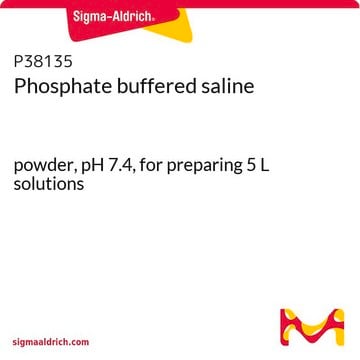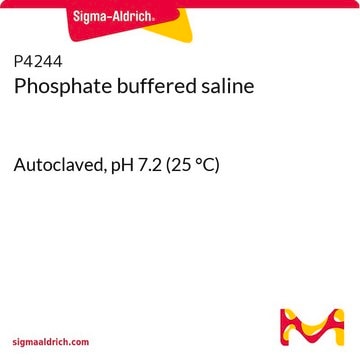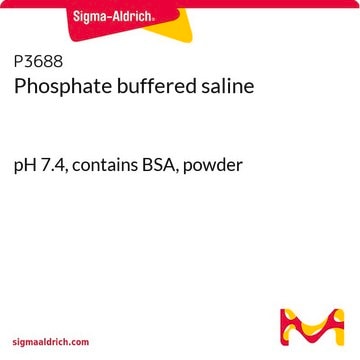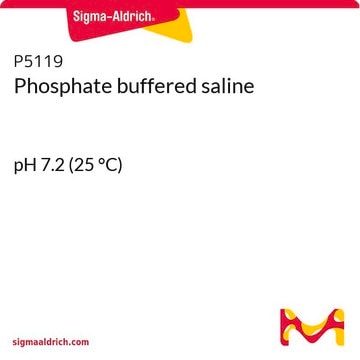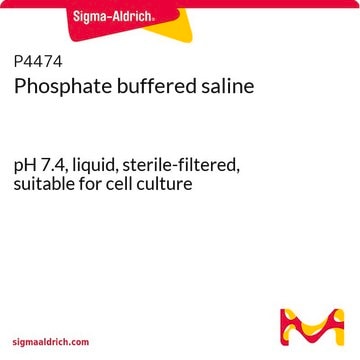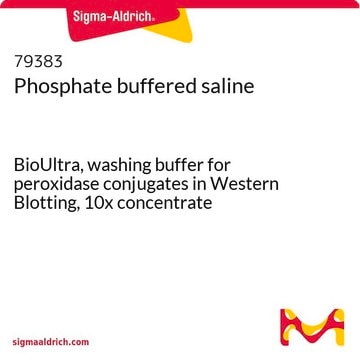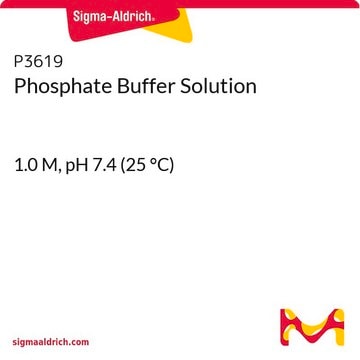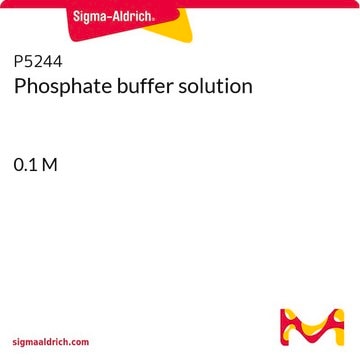P3744
Phosphate buffered saline
powder, pH 7.6 (25 °C)
Synonym(s):
PBS
Sign Into View Organizational & Contract Pricing
All Photos(1)
About This Item
Recommended Products
Product Name
Phosphate buffered saline, pH 7.6 (25 °C)
form
powder
Quality Level
pH
7.6 (25 °C)
application(s)
diagnostic assay manufacturing
Looking for similar products? Visit Product Comparison Guide
Other Notes
Each pouch prepares a 1 liter solution containing 120 mmol sodium chloride, 2.7 mmol potassium chloride, and 10 mmol phosphate buffer salts.
Storage Class Code
11 - Combustible Solids
WGK
WGK 1
Flash Point(F)
Not applicable
Flash Point(C)
Not applicable
Personal Protective Equipment
dust mask type N95 (US), Eyeshields, Gloves
Choose from one of the most recent versions:
Already Own This Product?
Find documentation for the products that you have recently purchased in the Document Library.
Customers Also Viewed
Vicente J Gallardo et al.
Journal of microbiological methods, 160, 143-153 (2019-04-12)
Ultrafiltration concentration of microorganisms in large volume water samples containing high levels of particulate matter was evaluated in a proof of concept study. The organisms tested were Bacillus atrophaeus subspecies globigii spores and MS2 bacteriophage. To produce the large volume
Yong N Li et al.
The Journal of comparative neurology, 516(5), 442-453 (2009-08-06)
Horizontal cells (HCs) are involved in establishing the center-surround receptive field organization of photoreceptor and bipolar cells. In many species, HCs respond differentially to colors and may play a role in color vision. An earlier study from our laboratory suggested
S Vaddiraju et al.
Biosensors & bioelectronics, 24(6), 1557-1562 (2008-10-01)
The performance of an implantable glucose sensor is strongly dependent on the ability of their outer membrane to govern the diffusion of the various participating species. In this contribution, using a series of layer-by-layer (LBL) assembled outer membranes, the role
Beatriz del Rio et al.
Clinical and vaccine immunology : CVI, 15(9), 1429-1435 (2008-07-18)
Mucosal immunization is advantageous over other routes of antigen delivery because it can induce both mucosal and systemic immune responses. Our goal was to develop a mucosal delivery vehicle based on bacteria generally regarded as safe, such as Lactobacillus spp.
Patricia A Trimmer et al.
Molecular neurodegeneration, 4, 26-26 (2009-06-19)
It has been hypothesized that reduced axonal transport contributes to the degeneration of neuronal processes in Parkinson's disease (PD). Mitochondria supply the adenosine triphosphate (ATP) needed to support axonal transport and contribute to many other cellular functions essential for the
Our team of scientists has experience in all areas of research including Life Science, Material Science, Chemical Synthesis, Chromatography, Analytical and many others.
Contact Technical Service

